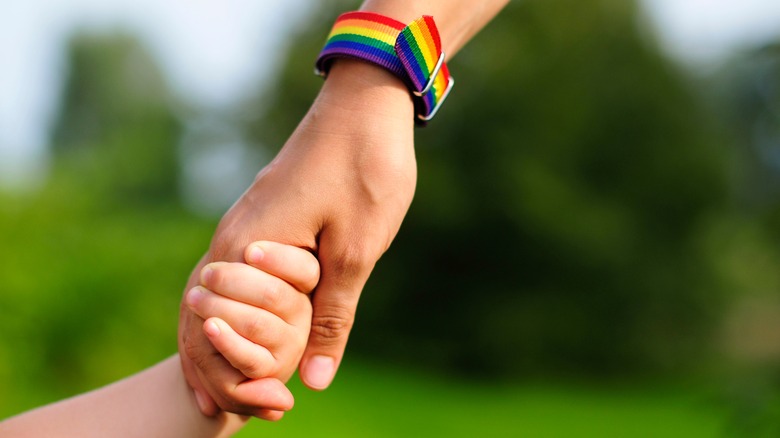New Research Reveals Parental Support Plays A Significant Role In The Wellbeing Of LGBTQ Youth
Supportive parents and caregivers can significantly lower the risk of suicide among LGBTQ youth, according to a research brief from The Trevor Project. The brief analyzed data from the Trevor Project's 2022 National Survey on LGBTQ Youth Mental Health, which compiled responses from nearly 34,000 LGBTQ people between the ages of 13 and 24 (via Fatherly). The survey asked respondents a range of questions about the state of their mental health and well-being and found that 45% of LGBTQ youth in the U.S. seriously considered suicide within the last year.
However, the data also revealed that family support and parental acceptance can lower the risk of suicide for LGBTQ youth by 36% to 40%. The most frequently cited supportive actions taken by parents included being welcoming to children's LGBTQ friends and partners, talking with LGBTQ youth respectfully about their identities, supporting their gender expression, using their names and pronouns correctly, openly discussing LGBTQ issues with youth, and educating themselves about the LGBTQ community. The research brief concluded that these actions and behaviors lowered the odds of suicide by 40% for cisgender LGBQ youth and 36% for transgender and nonbinary youth.
How parents can support their LGBTQ children
According to Healthline, this brief highlights the importance of the role parents play in the mental health and well-being of their LGBTQ children. That's because LGBTQ youth already experience elevated rates of stigma, bullying, and minority stress because of their sexual orientation and gender identity. This type of mistreatment and stigmatization can increase the risk of depression and suicidal ideation. Growing up in an accepting and supportive home environment, however, "can play a powerful role in destigmatizing the LGBTQ community and combating misinformation around what it means to be part of this community," Dr. Jonah DeChants, a research scientist at The Trevor Project, told Healthline.
That's why it's important for parents and caregivers to be open and respectful when discussing their children's sexual orientation or gender identity. Not every parent will understand what it means to be LGBTQ or say the right things all the time, but being respectful to LGBTQ youth and receptive to their thoughts and concerns can help create a more positive dialogue between parents and their children.
If you or anyone you know is having suicidal thoughts, please call the National Suicide Prevention Lifeline at 1-800-273-TALK (8255).


